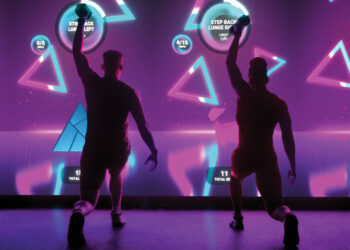The Gympocalypse argument is that newly established players in the fitness industry — like Peloton and True Rowing — will eviscerate the health club industry by bringing the best of the gym experience into the home with anytime, at-home convenience and unique, online communities. The report compares fitness industry technology dynamics and consumer preference trends to those that led to the retail apocalypse.
The parallel is this. Amazon’s business model had a profound impact on the retail industry because, over time, consumers began favoring the online shopping experience. Peloton and others that offer engaging online and interactive content will also, over time, draw fitness consumers out of the club in large numbers to enjoy at-home fitness that meets a wider set of customer needs at a lower price.
In an August 2018 article for Racked, senior reporter Cheryl Wischhover wrote: “Traditional gyms should theoretically have a leg up on the startups because they have the talent and programming part done. More gyms need to figure out the tech part, because if they don’t go virtual soon, they could wind up just like that NordicTrack your aunt has gathering dust in her basement.”
As dire as the Gympocalypse predictions are, the authors may actually understate the threat posed to the health club industry by these new in-home fitness solutions. It is precisely the Baby Boomer cohort that is now leading club membership growth that Peloton and others are targeting. In addition, they are meeting a consumer need for fitness communities that can only be created online.
The reason why Peloton is reviewed as “cult like” by health and wellness reporters who reviewed it, is that Peloton intended to create more than a product you use, but an online community you join.
The real threat to the club industry is that equipment manufacturers have not yet supplied solutions that bring the member into the club to engage in a satisfying and socially cohesive experience that delivers real health benefits, and that gives members the sense of community that online, in-home products offer.
What’s needed is a leap-frog technology for the club that takes the interactive, online, content-based fitness community concept a step further. The answer is exciting outdoor competitions in virtual reality (VR) worlds that members engage in from club locations, also know as Virtual Sports, or vSports.
vSports, unlike any other interactive online content, is a true sport in every sense of the word. Through VR, members are actively engaged in expansive outdoor virtual worlds, while seated on stationary bikes indoors in the club. Players are fully immersed in the action as if they are actually on a California coast road with other cyclists or in a tank battle fighting for their life on mountainous terrain.
Add the personal and team motivational power of gamification with leaderboards and prizes to the experience of being outdoors in VR, and you have an entirely new competitive sport that’s played from fitness centers. A club with 20 locations across the U.S. can create a national vSports league to compete among teams, one team per club location, competing in a national virtual arena. Members join these communities through their health club membership and enjoy a sense of belonging to a large and growing sport.
Over time vSports may give millions of health club members a new reason to go to the gym daily — to be engaged with their community of vSports players in outdoor virtual worlds.
It’s up for debate whether fitness industry technology dynamics and consumer preference trends that Peloton and others are riding will develop into a full-blown crisis for health clubs, as severe as the retail apocalypse for product retailers. In any case, vSports is here today to counter the trend.
Eric Janszen is the CEO and co-founder of VirZoom, Inc. For more information, call +1.781.354.3243 or visit virzoom.com.










